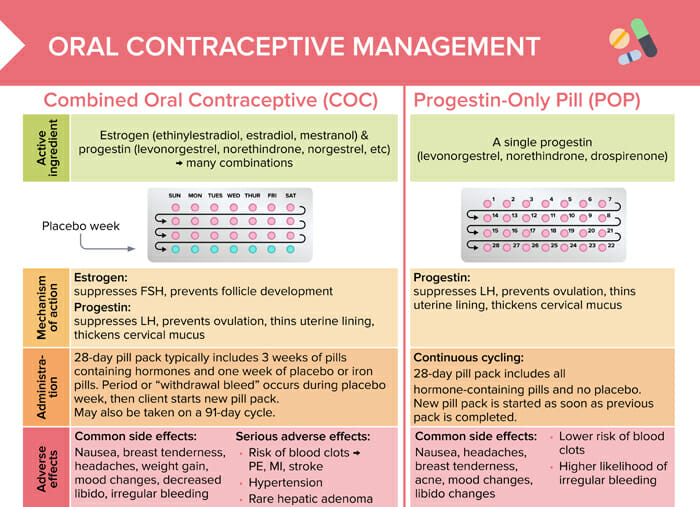What are oral contraceptives?
Oral contraceptives are medications taken to prevent pregnancy that are taken orally, typically in the form of pills.
How do oral contraceptives work?
Oral contraceptives work primarily by inhibiting ovulation and altering the lining of the uterus and cervical mucus to hinder sperm movement.
- Progestin suppresses luteinizing hormone (LH), prevents ovulation, thins the uterine lining, and thickens the cervical mucus.
- Estrogen suppresses follicle-stimulating hormone (FSH) and prevents follicle development.
Types of oral contraceptives
Combined oral contraceptives
Combined oral contraceptives contain estrogen (ethinylestradiol, estradiol, mestranol) and progestin (levonorgestrel, norethindrone, norgestrel, etc). There are many different combinations available.
A 28-day pill pack typically includes 3 weeks of pills containing hormones and one week of placebo or iron pills. Period or “withdrawal bleed” occurs during placebo week, after which the client starts a new pill pack. Combined oral contraceptives may also be taken on a 91-day cycle.
Progestin-only pills
Progestin-only pills contain only a single progestin (levonorgestrel, norethindrone, drospirenone).
They are administered in “continuous cycling,” meaning that a 28-day pill pack includes all hormone-containing pills and no placebo. The new pill pack is started as soon as the previous pack is completed.
What are triphasic oral contraceptives?
Triphasic oral contraceptives are a type of combined oral contraceptive pill designed to more closely mimic the natural hormonal fluctuations of a woman’s menstrual cycle. Unlike monophasic pills, which deliver the same amount of estrogen and progestin every active day, triphasic pills vary the hormone dose in three phases over the active pill-taking days.
Adverse effects of birth control pills
Common side effects of oral contraception
Common adverse effects of oral contraception include:
- Serious:
- Risk of blood clots (lower in progestin-only pills)
- Hypertension
- Rare hepatic adenoma
- Nausea
- Breast tenderness
- Headaches
- Acne
- Weight gain
- Mood changes
- Libido changes
- Irregular bleeding (higher likelihood in progestin-only pills)
Contraindications and precautions
Contraindications:
- Smokers > 35 years old
- Hx of blood clot
- Abnormal liver function
- Known breast cancer
- Unexplained abnormal vaginal bleeding
Precautions:
- HTN
- Cardiac disease
- Diabetes
- Migraine
- Epilepsy
- Gallbladder disease
- Uterine fibroids
- Smokers < 35 years old
- History of bariatric surgery
- Abnormal liver function
Smoking and oral contraceptives
The primary concern regarding smoking and oral contraceptives centers on the increased risk of cardiovascular complications. Both factors can increase the risk of blood clots, hypertension, and damage to blood vessels.
Oral contraceptives and antibiotics
Some antibiotics are believed to interfere with the efficacy of birth control pills (e.g., rifampin). To eliminate any risk, it is recommended clients use backup contraception methods for the duration of antibiotic treatment and a few days afterward.
Why should one avoid oral contraceptives with HPV?
Some studies suggest that long-term use of oral contraceptives (for 5 years or more) may increase the risk of cervical cancer in women who have an HPV infection. Those with a known HPV infection should discuss their contraceptive choices with their healthcare provider. Regular cervical screenings remain essential regardless of birth control method.
When to start birth control pills & other client education points
- Teach client what to do in case of missed pills and when to use a backup method
- Initiation: Start any day of cycle and use a backup method for 7 days.
- Danger signs to report:
- Sharp abdominal pain
- Severe chest pain
- Severe headache
- Eye/vision changes
- Sharp leg pain
- Advise clients that many medications interact with contraceptives; they should consult provider if taking:
- Antibiotics
- Anxiolytics
- Anticonvulsants
- Antidepressants
- Warfarin
Do you ovulate on birth control?
No, most combined oral contraceptives suppress ovulation.
Progestin-only pills mainly work by thickening cervical mucus, but they can also suppress ovulation in some users.
How long does it take for oral birth control to get out of your system?
Oral birth control hormones are typically cleared from the system within a few days.
What’s the earliest ovulation after stopping a birth control pill?
The time it takes for a woman’s menstrual cycle and fertility to return to normal can vary, ranging from a few weeks to a few months. Some women may experience immediate return of fertility, while others might take significantly longer.
